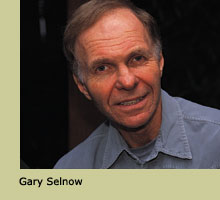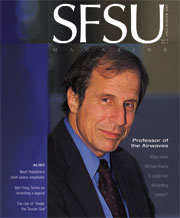
Untangling World Events On a Thursday night in October nearly two dozen students and community members file into Humanities 133 to listen to a first-hand account of life in post-war Iraq. Welcome to Behavioral Social Sciences 277: "The United States and the World in the 21st Century." There's no required reading list. No tests or papers. The new course raises larger questions than "Will that be on the final exam?" The Thursday night lectures, each concluding with a question-and-answer session, are bringing the on- and off-campus community information on topics related to the war on terrorism and creating a forum for attendees to share their concerns and opinions about evolving international affairs. Students may opt to take the class for two units of credit, or join faculty, staff and the general public, all of whom are welcome to attend free of charge. Judy Bonhiver, who recently joined the staff of SFSU's Marian Wright Edelman Institute, attended the lectures faithfully. "The intellectual diversity and depth of knowledge of the faculty is just awesome," she says. "I don't think they could find a better group of speakers all in one place anywhere else in the country." From History Professor Jerald Combs' "The War on Terrorism: How We Got Here" to Speech and Communication Studies Professor Joseph Tuman's "The Language of Terrorism," 25 faculty members in BSS and the colleges of Humanities and Business are sharing their insights with attendees. The focus of the lectures shifts across the globe, touching on nation-building in Iraq, European/U.S. relations, Middle East politics, drug wars in South America, Chinese/Korean relations and the war on terrorism in Africa. Next fall's BSS 277 class and public lecture series will be on the 2004 U.S. Presidential election. You can preview the series at a faculty panel discussion sponsored by the College of Behavioral and Social Sciences on March 18 at 5:30 p.m. For information:http://bss.sfsu.edu  
| | | 
Tonight's guest, Professor Gary Selnow, is the founder of World Internet Resources for Education and Development (WiRED), a nonprofit organization that uses computer-based technology to bring health information to people in developing countries. Last spring, backed by funding from the U.S. State Department, Selnow traveled to Iraq to assess the needs of the country's medical community. He found medical textbooks horribly out of date and libraries stripped clean by looters. On a return trip in June, Selnow and WiRED volunteers installed medical information centers at four teaching hospitals, bringing computer networks and an extensive collection of CD-ROMs packed with health care information to more than 2,500 faculty and students in Baghdad and the surrounding region. Although Iraq does not have Internet access right now, each computer is ready to take visitors online once repairs are made to a fiber optic cable. Danger was always present on the trip. A meeting with the Ministry of Health ended abruptly when military police ushered Selnow and his fellow volunteers out a back door. Someone had placed a bomb inside the main entrance. "All that's happening there goes against rational thought," the professor tells the audience. While various factions continue to cause chaos in the country, Selnow feels uplifted by the spirit of students and doctors in Iraq's universities. He points to a computer installation at Al Kadhymia Teaching Hospital in Iraq. The facility had been heavily looted. The only room with enough electrical outlets for 10 computer work stations had been reduced by looters to a mess of broken desks, shattered glass and garbage. Selnow was disheartened, but returned two days later to find the room spotless. A group of 20 Iraqi doctors had heard about Selnow and his computers. At the end of their rounds, the doctors grabbed mops and shovels and spent an entire night clearing the way for WiRED. After decades of being cut off from new developments in health care, "they really wanted this information so that they could do better for their patients," Selnow says. Effective assistance programs are like ropes, the professor says. "You cannot push them. The people must pull for themselves. You have to involve Iraqis at every step, use existing structures and ask that [people] give back." Selnow found the Iraqi doctors didn't need to be reminded of the latter: "They told us, âWhen we get online we want to share our insights with the world.'" | |

